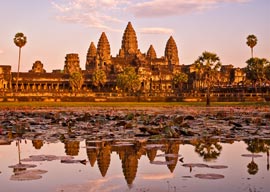
March 15, 2015

Angkor Wat. Cambodia
Source: Shutterstock
No one who reads Seyyid Qutb’s book Milestones could be in any doubt that the destruction of ancient monuments by ISIS or the Taliban is perfectly in keeping with Islamist thought. Milestones is an important book not because of its merits, either intellectual or literary, but because of its influence. It was one of the founding texts of modern Islamic fundamentalism (if that is not an oxymoron) and is worth studying not for itself but for the light it sheds on a certain mentality, namely that of Moslems who believe themselves in possession of the highest truth yet find themselves permanently sunk in moral, economic and social squalor.
The book breathes hatred or contempt for all that is not Islamic and is a kind of Islamo-Trotskyist call to permanent revolution until the whole world accepts Islam
When Islam strives for peace, its objective is not that superficial
peace which requires that only that part of the earth where the
followers of Islam are residing remains secure. The peace which
Islam desires is that the religion (i.e. the Law of the society) be
purified for God, that the obedience of all people be for God alone…
And since Islam is the one true religion, it follows that real as against pseudo– peace necessitates the acceptance everywhere of Islam. Just as Trotsky did not believe in socialism in one country, so Qutb did not believe in Islam in one country (and Trotsky was a much better writer that Qutb, of course).
Qutb makes it quite clear that no consideration at all is due the polytheists, against whom a merciless war not only could, but must, be fought. Moreover, in his view, all that existed before Islam was mere jahiliyyah, ignorance. These are not the kind of ideas propitious to the preservation of ancient monuments, to put it mildly.
Lord Curzon, Viceroy of India, was not a man without a certain self-confidence, as the following lines from a little jingle about him suggest:
My name is George Nathaniel Curzon,
I am a most superior person…
But, unlike the Islamists of today, he was not arrogantly barbaric. In a speech to the Royal Asiatic Society in Bengal in 1900 about the obligation of the colonial government to preserve historical monuments, Curzon said:
If there be any one who says to me that there is no duty devolving
upon a Christian Government to preserve the monuments of a pagan
art or the sanctuaries of an alien faith, I cannot pause to argue with
such a man. Art and beauty, and the reverence that is owing to all
that has evoked human genius or has inspired human faith, are
independent of creeds, and, in so far as they touch the sphere of
religion, are embraced by the common religion of all mankind.
Viewed from this standpoint, the rock temple of the Brahmans
stands on precisely the same footing as the Buddhist Vihara, and the
Mohammedan Musjid as the Christian Cathedral. There is no
principle of artistic discrimination between the mausoleum of the
despot and he sepulchre of the saint. What is beautiful, what is
historic, what tears the mask off the face of the past and helps us to
read its riddles and to look it in the eyes – these, and not the dogmas
of a combative theology, are the principal criteria to which we must
look.
Anyone who does not recognise the generosity and even nobility of these words is a barbarian, who values his own petty notions of consistency more highly than civilisation itself.
But we should not make the mistake of supposing that just because the Islamists are barbarians, that barbarism has existed, and exists, elsewhere. Barbarism is a permanent temptation and has its own peculiar psychological rewards. The Cultural Revolution in China was a mass outbreak of barbarism carried out in the name of the dogma of a combative theology, albeit a political pseudo-theology. It was because of, and not in spite of, its barbarism that it received so much support and admiration by European intellectuals, particularly in France.